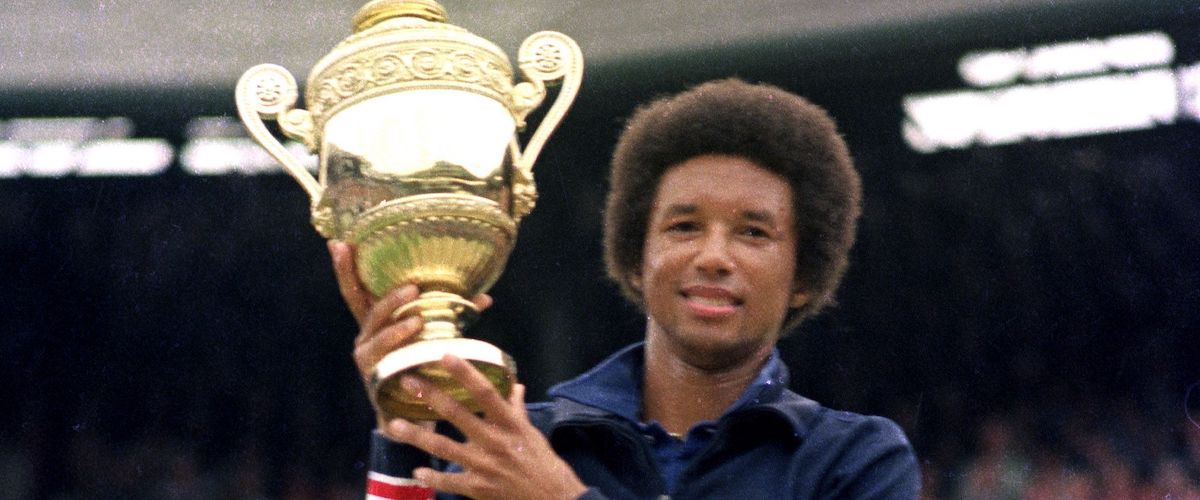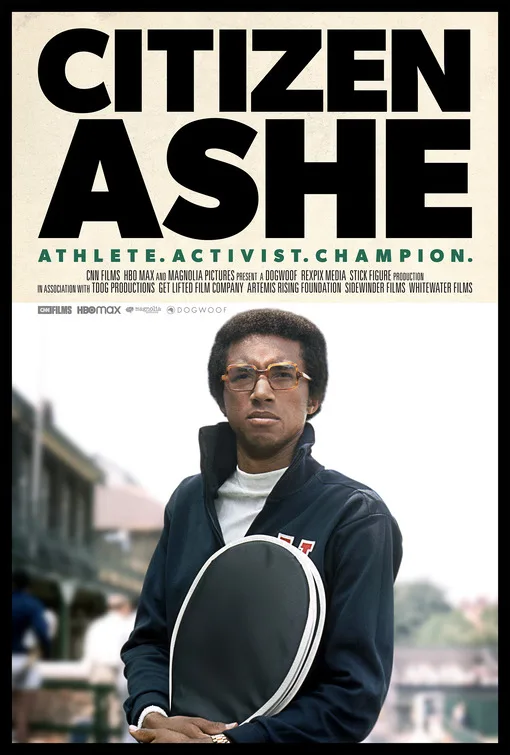Tennis is on the cinematic menu in 2021. First, we had “King Richard.” Now we have “Citizen Ashe,” the new documentary by directors Rex Miller and Sam Pollard. These releases have some things in common. Both films look at Black excellence in a sport that, as one talking head here points out, “was so White that even the balls and the uniforms were white.” Richard Williams and Arthur Ashe were forced to practice on courts in their respective neighborhoods and had issues when trying to use or compete in Whites-only arenas. Ashe may have even been on Williams’ mind when he decided to point his superstar daughters toward tennis. Oddly enough, both movies have a societal position in their titles that describes how their subjects will be pitched to the audience; this is a much more down-to-Earth depiction befitting a “citizen” who just happens to be tennis royalty.
Before the Williams sisters, and after Althea Gibson, there was Arthur Ashe. Ashe was the first major Black male tennis star. According to Wikipedia, he’s also the only Black man to win the singles title at Wimbledon, the Australian Open and the US Open. That last event is held in the world’s largest tennis court, Arthur Ashe Stadium in Flushing, Queens. After retiring in 1980 due to heart issues, Ashe became a coach and a sportscaster. On the activist front, he campaigned against apartheid in South Africa and, after contracting AIDS from a blood transfusion, he started the Arthur Ashe Foundation for the Defeat of AIDS. Eventually, he succumbed to the disease on February 6, 1993.
Miller and Pollard show us how all of this transpired, and it’s a lot more complicated than that brief synopsis indicates. For example, Ashe’s path to activism is far from a straight line, nor is it without a nuance that, at times, is fraught with controversy. Ashe came to athletic prominence during the turbulent battle for Civil Rights in the 1960s, yet he was far less vocal than his contemporaries. “Citizen Ashe” shows how his the media crudely used his demeanor in stark contrast to “angry Black athletes” like Cassius Clay. As Clay and Lew Alcindor were becoming Muhammad Ali and Kareem Abdul-Jabbar respectively, they were also speaking out against racial injustices. When asked to add his own voice to the chorus, Ashe declined. A scene of him referring to Jim Crow treatment as being “mildly discriminated against” made me utter some choice profanities. Olympic Project for Human Rights founder Dr. Harry Edwards, a prominent figure in this documentary, says at one point “we thought he was an Uncle Tom!”
“Citizen Ashe” digs deeper, exploring the differences in sports and how they may influence a certain type of response to injustice. Like Venus and Serena’s dad, Ashe’s father insisted on tennis rather than the “expected” sports a Black person would play. Seen in old photographs and footage, the elder Ashe has a distinguished but stern demeanor. Raising his two sons after the death of their mother, he instilled in his sons a respect for authority that would keep them alive in segregated times. Big men like Jim Brown and Ali were in far rougher sports than tennis (and more integrated ones, at that), and therefore could make some noise and rattle the racists. For tennis, Ashe had to take the more docile tact his idol Jackie Robinson did for baseball. Somehow that allowed him to run the long game when it came to observing and changing things from within. Folks were more unguarded. Dr. Edwards returns late in the documentary to explain this phenomenon far more eloquently than I have.
The directors and their four editors balance the right amount of news footage, sports highlights, talking heads and Ashe’s own words. This isn’t just about Ashe’s athletic and coaching achievements, though the footage of him methodically dismantling Jimmy Connors at Wimbledon—and the scenes of John McEnroe driving Coach Ashe crazy—will be catnip for tennis fans. We get time to hear Ashe say he envies McEnroe because, as a White man, he got the opportunity to vent his rage for public consumption. That luxury wouldn’t have existed for Arthur Ashe. We also see footage of his hero, Nelson Mandela, getting released and hear stories of his interaction with the tennis star afterwards. And we learn from his brother Johnnie that, in order to keep Arthur from being drafted due to a law about brothers not being able to serve simultaneously, Johnnie re-enlisted in the military after his tour in Vietnam was over.
By the time we get to Ashe’s AIDS-related activism, and the horrible way USA Today twisted his arm into revealing his diagnosis, “Citizen Ashe” has taken us on a complex, sometimes infuriating tour of its subject’s life. It begins with the birth of an athlete, then morphs into the creation of an activist. The transition is so subtle that you only realize it after the film ends. Fans of tennis and fascinating American lives will be equally satisfied.
Airs on CNN on Sunday, June 26.




















